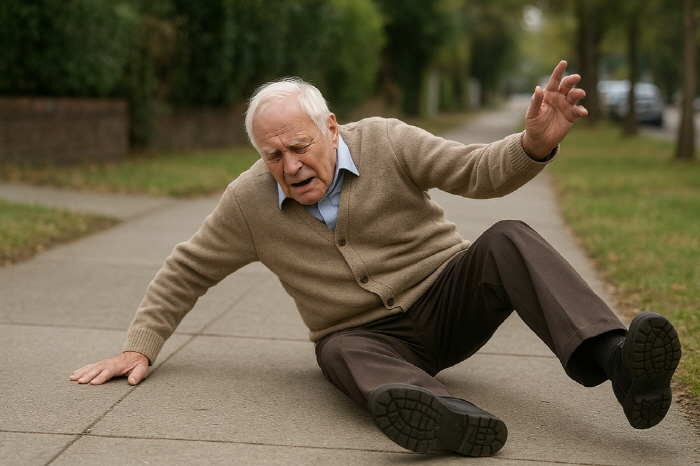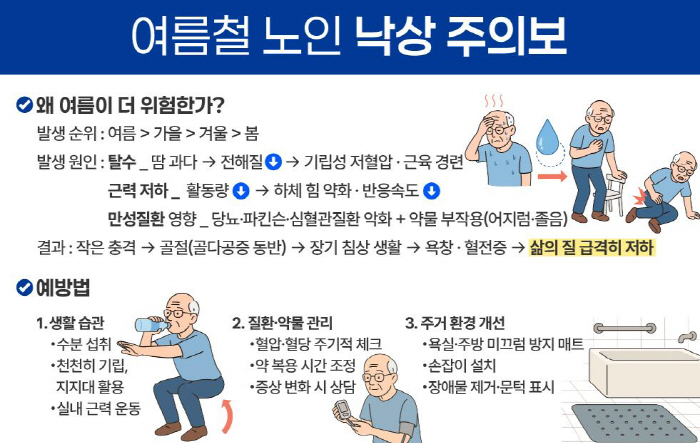Summer falls more dangerous than icy roads...It could lead to fractures in the elderly
Aug 19, 2025
|
According to the analysis of risk information trends for the elderly from 2020 to 2024 released by the Korea Consumer Agency, the number of fall accidents for the elderly was highest in the order of summer, autumn, winter, and spring. Dehydration, dizziness, and decreased muscle strength caused by heat are the main reasons. The elderly have low bone density and dull reflexes, which increase the risk of injury. Falls are not just scratches and bruises, but can lead to fractures, post-disability, long-term care, and even death, so caution is needed.
Yoon Hyung-jo, head of the medical department at H Plus Yangji Hospital (Orthopedic Surgeon), warned that "the high-temperature environment in the summer greatly increases the risk of falling by breaking the circadian rhythm and homeostasis of the elderly" and that "the decrease in activity caused by heat accelerates muscle atrophy and creates a vicious cycle that weakens the support of the lower body."
◇Summer falls, dehydration, decreased muscle strength, and chronic diseases are the causes
Summer falls in the elderly are not caused by simple carelessness, but are the result of a combination of physical and environmental factors. If you sweat a lot in the heat, your body's water content decreases rapidly and dehydration occurs. Older people feel less thirsty than younger people and are vulnerable to dehydration due to less water in their bodies. In dehydration, blood pressure decreased due to decreased blood volume, and sat down Orthostatic hypotension, which causes instantaneous dizziness when standing up, is likely to appear. At this time, you can lose your balance and fall. In addition, a lack of electrolytes (sodium, potassium, etc.) discharged from sweat causes muscle spasms and loss of strength, increasing the risk of falling.
Deterioration of muscle strength also contributes to falls.
Due to the aging population, the lower body strength is weakened due to decreased muscle weakness and summer activity, resulting in poor walking stability and slow response, which can lead to fall accidents. In addition, chronic diseases such as diabetes, Parkinson's disease, and cardiovascular disease also increase the risk of falls. Some drugs taken for chronic diseases can cause side effects such as dizziness, drowsiness, and fatigue. In particular, in summer, dehydration can increase drug concentration, resulting in stronger side effects. If you feel your body is different from usual after taking the drug, you must consult a doctor or pharmacist to adjust the dose or type.
Yoon Hyung-jo, vice president of medical department, said "The elderly usually have osteoporosis, so if they fall, their bones are easily broken even with a small impact, leading to a long-term bed life."He explained that "the quality of life drops sharply as there is a high risk of complications such as bathing and thrombosis, and movement is limited."
◇ Disease management, water intake, exercise, and creation of a safe residential environment, etc
To prevent falls, it is necessary to create a safe residential environment. Install non-slip mats in the bathroom and kitchen and ask for a handle or safety bar. It is recommended to organize objects and wires that interfere with traffic, and to call attention by attaching a noticeable colored tape to places where there is a risk of falling, such as thresholds or stairs. It is safer to use a cane when walking.
Falls are usually accompanied by dizziness, which can lead to accidents, so I sat down after drinking plenty of water in hot weather You have to move slowly when you stand up. In particular, steady muscle exercise is the key to preventing falls. It is recommended to exercise regularly to develop a sense of balance, such as stretching, bare-handed gymnastics, standing on the wall, standing on one foot, and squats in a cool air-conditioned room.
If you are suffering from a chronic disease, you should check your blood pressure and blood sugar, and make a disease management plan that suits you. Blood pressure drugs and sleeping pills can cause dizziness and drowsiness after taking them, so the time to take the drug is adjusted to the time when the amount of activity is low through consultation with a specialist.
|
This article was translated by Naver AI translator.















